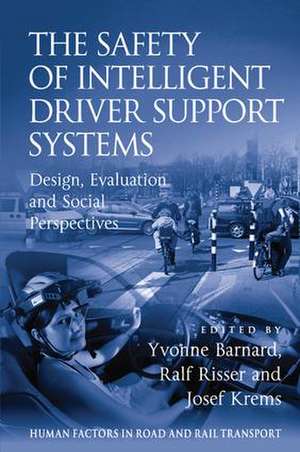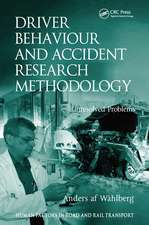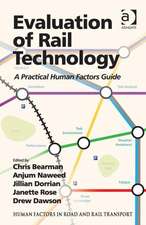The Safety of Intelligent Driver Support Systems: Design, Evaluation and Social Perspectives: Human Factors in Road and Rail Transport
Autor Ralf Risser Editat de Yvonne Barnarden Limba Engleză Hardback – 7 apr 2011
| Toate formatele și edițiile | Preț | Express |
|---|---|---|
| Paperback (1) | 427.16 lei 6-8 săpt. | |
| CRC Press – 31 mar 2017 | 427.16 lei 6-8 săpt. | |
| Hardback (1) | 1112.55 lei 6-8 săpt. | |
| CRC Press – 7 apr 2011 | 1112.55 lei 6-8 săpt. |
Din seria Human Factors in Road and Rail Transport
- 8%
 Preț: 404.38 lei
Preț: 404.38 lei - 8%
 Preț: 404.43 lei
Preț: 404.43 lei - 30%
 Preț: 861.11 lei
Preț: 861.11 lei - 15%
 Preț: 427.16 lei
Preț: 427.16 lei - 18%
 Preț: 1117.07 lei
Preț: 1117.07 lei - 15%
 Preț: 455.31 lei
Preț: 455.31 lei - 15%
 Preț: 427.16 lei
Preț: 427.16 lei - 15%
 Preț: 427.16 lei
Preț: 427.16 lei - 15%
 Preț: 427.16 lei
Preț: 427.16 lei - 24%
 Preț: 336.66 lei
Preț: 336.66 lei - 15%
 Preț: 431.25 lei
Preț: 431.25 lei - 22%
 Preț: 355.49 lei
Preț: 355.49 lei - 22%
 Preț: 353.39 lei
Preț: 353.39 lei - 18%
 Preț: 1008.97 lei
Preț: 1008.97 lei - 15%
 Preț: 426.20 lei
Preț: 426.20 lei
Preț: 1112.55 lei
Preț vechi: 1356.77 lei
-18% Nou
Puncte Express: 1669
Preț estimativ în valută:
212.91€ • 231.19$ • 178.85£
212.91€ • 231.19$ • 178.85£
Carte tipărită la comandă
Livrare economică 22 aprilie-06 mai
Preluare comenzi: 021 569.72.76
Specificații
ISBN-13: 9780754677765
ISBN-10: 0754677761
Pagini: 210
Dimensiuni: 156 x 234 x 13 mm
Greutate: 0.55 kg
Ediția:1
Editura: CRC Press
Colecția CRC Press
Seria Human Factors in Road and Rail Transport
ISBN-10: 0754677761
Pagini: 210
Dimensiuni: 156 x 234 x 13 mm
Greutate: 0.55 kg
Ediția:1
Editura: CRC Press
Colecția CRC Press
Seria Human Factors in Road and Rail Transport
Public țintă
Academic and Professional Practice & DevelopmentCuprins
Contents: Preface; Introduction, Yvonne Barnard; Intelligent driver support system functions in cars and their potential consequences for safety, Annie Pauzie and Angelos Amditis; Safety according to IDSS functions and to different driver types, Ralf Risser and Ioanna Spyropoulou; Design for safety: a cognitive engineering approach, Guy Boy; HUMANIST contributions for the development of guidelines and standards on HMI, Christhard Gelau, Martin Baumann and Annie Pauzié; Evaluating impact on drivers and drivers' tasks, Ioanna Spyropoulou; Tools and procedures for measuring safety-relevant criteria, Josef Krems and Tibor Petzoldt; Psycho-physiological measures of driver state, Ellen Wilschut and Dick de Waard; Public impact: non-equipped and vulnerable road users and residents, Ralf Risser; Different types of drivers' social problems, Juliane Haupt and Ralf Risser; The future of IDSS, Yvonne Barnard, Ralf Risser, Clemens Kaufmann, Josef Krems and Tibor Petzoldt; Index.
Notă biografică
Yvonne Barnard has been a senior research fellow at the Institute for Transport Studies of the University of Leeds since 2008. Following her studies of psychology, with a specialisation in artificial intelligence, she has worked since 1984 as a researcher in the field of information technology in education, first at the University of Utrecht in the department of Educational Research, then at the University of Amsterdam in the department of Social Science Informatics. She obtained a PhD at the University of Amsterdam with a thesis on technologically-rich learning environments. From 1995-2000 she worked as a senior researcher at the Dutch TNO Human Factors Research Institute, coordinating a research group on learning processes, and managing applied research projects. From 2000-2007 she worked as a senior research scientist at EURISCO International in Toulouse, France, especially on human factors in the aeronautic sector. Her research has been focussed on human factors in the use of (information) technology. A large part of her work was performed in European research and development projects. Ralf Risser is owner of FACTUM and founding member of INFAR (an association for the testing, training and rehabilitation of car drivers in Austria). He obtained a PhD in psychology & sociology at the University of Vienna, and was an assistant professor and lecturer at both the University and the Technical University of Vienna. From February 2005 he has been a visiting professor at the Technical University of Lund, Sweden. From 1993 to 2003 he was Convenor of the Task Force Traffic Psychology of the EFPA (European Federation of Psychologists' Associations), and a member of the EFPA Standing Committee Traffic Psychology since 2004, representing the Austrian Psychologists' Association. His work focuses on attitude and acceptance issues, marketing and motive research, driver diagnostics and rehabilitation. One of the main topics of his work is the development and use of instruments enabling adequate research into human motives as a basis for social management. He is a specialist of qualitative survey techniques, behaviour observation (developer of the Wiener Fahrprobe and derivatives of it), and group-dynamics-based creative and training measures. Josef Krems, Professor of cognitive and industrial psychology, graduated at the University of Regensburg in 1980. He then joined the cognitive psychology department as a research assistant. He obtained a PhD in psycholinguistics (1984), and a second PhD for work on computer modelling and expert systems (1990). From 1991-1993 he was a visiting assistant professor at Ohio State University, working on computational models of diagnostic reasoning. From 1994-1995 he was assistant professor at the Centre for Studies on Cognitive Complexity at the University of Potsdam. Since 1995 he is a full professor at Chemnitz University of Technology. His current research projects focus on man-machine interaction, safety, in-vehicle information systems, driver assistance, and green driving. Professor Krems is involved in the development and testing of evaluation procedures for new on-board systems for ISO. He has published and/or co-edited nine books and more than 100 papers in books, scientific journals and conference proceedings.
Recenzii
'Safety is the most important issue when it comes to Intelligent Driver Support Systems. These systems are either targeted at improving driver safety by preventing driver errors or have to ensure that drivers are well able to handle these systems safely. The book provides an excellent overview about the current state of the research with regard to these topics. A strong focus is set on methods to support the design and evaluation of these systems. It is a great book for researchers but especially for designers and engineers involved in developing these kinds of systems.' Mark Vollrath, TUI Braunschweig, Germany 'The book will be useful to beginners trying to find their way within the domain.’ HFES European Chapter Newletter, No1, 2012
Descriere
Road telematics and driver assistance systems offer a real opportunity to aid mobility and road safety. However, they also raise numerous questions. Problems related to the design and evaluation of intelligent driver support systems (IDSSs) and social perspectives related to their large scale introduction may only be fully addressed from a multi-disciplinary viewpoint. People from both engineering and social sciences, should be involved and this book provides such knowledge from both a human and social factors perspective.







